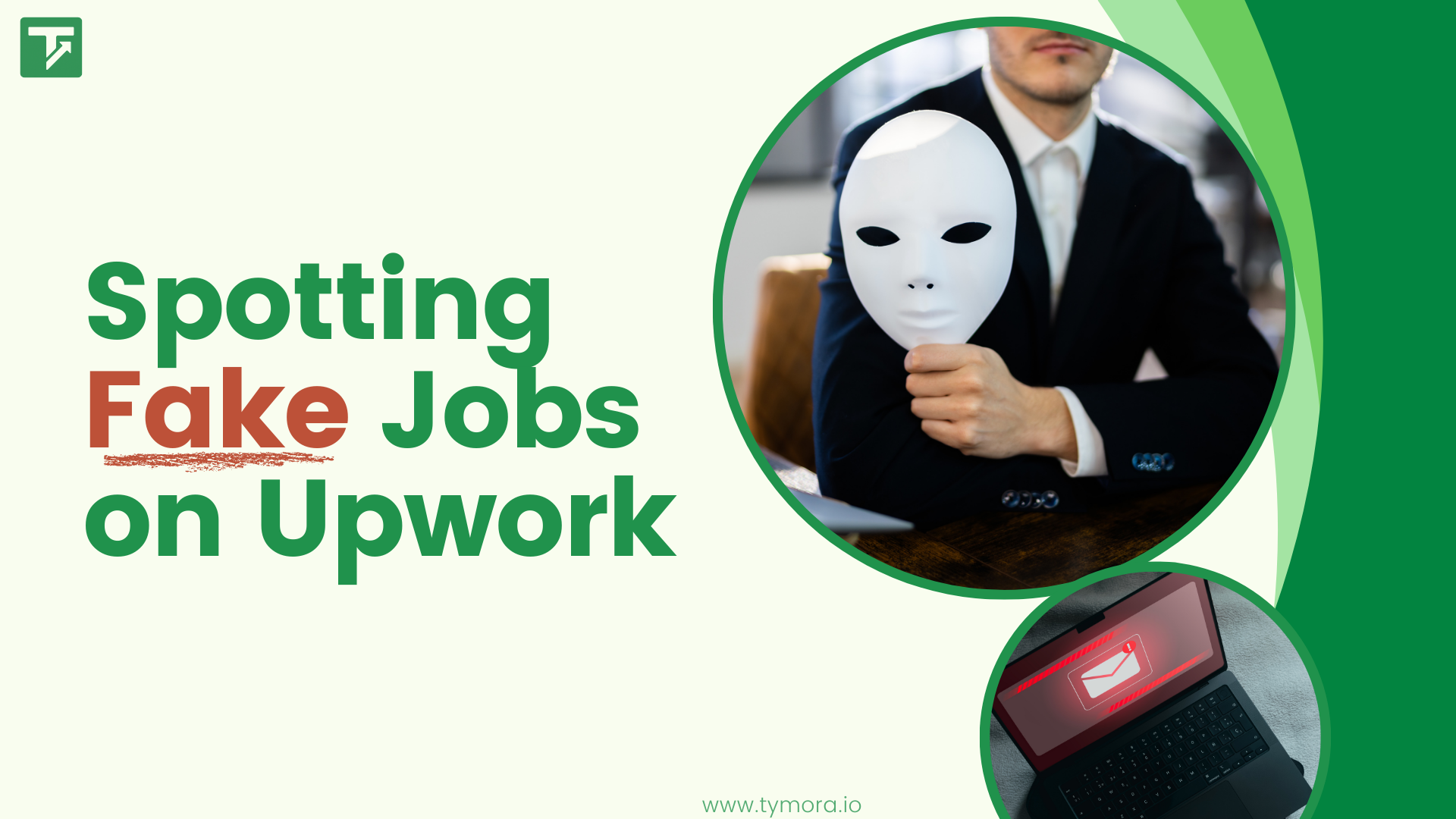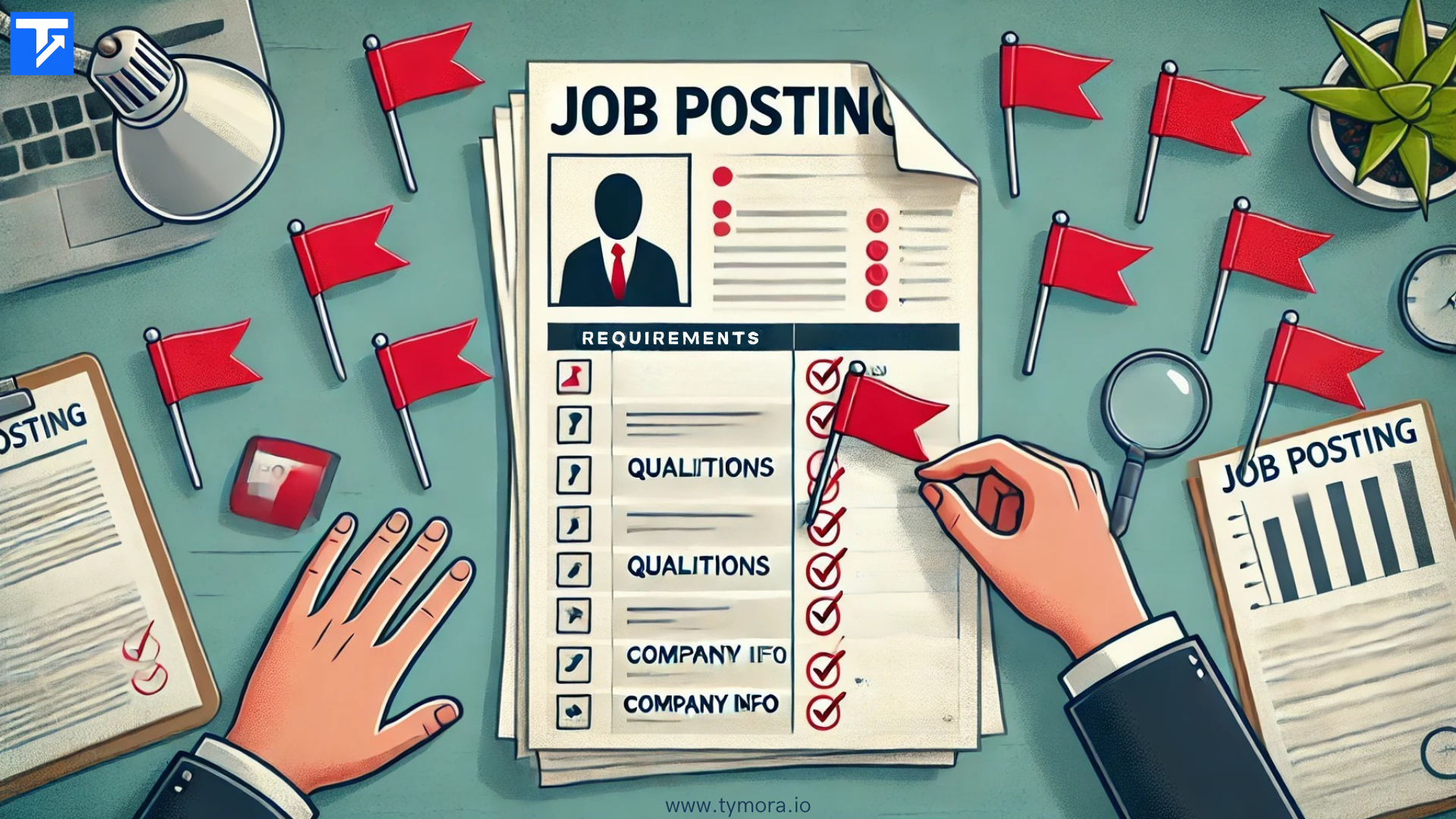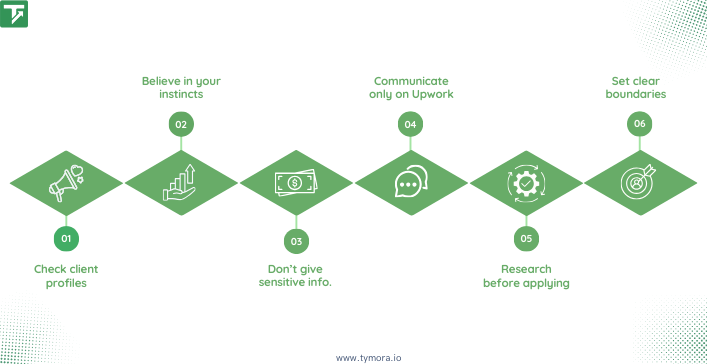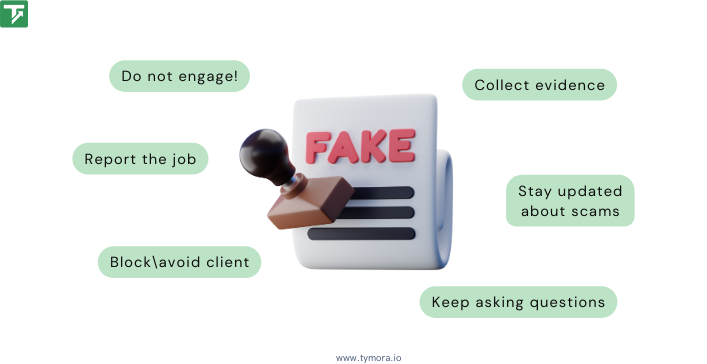9 Warning Signs of Fake Jobs on Upwork You Must Know

Imagine this: you’re excited, your profile is polished, and you’re finally ready to land your first project on Upwork. You scroll through listings and suddenly there it is. A perfect job: high pay, simple requirements, urgent need. Your heart skips a beat. Could this be the break you’ve been waiting for?
But hold on. What if it’s not real?
Fake jobs on Upwork exist, and they can waste your time, steal your information, or pressure you into unpaid work. The good news? You can spot them if you know the signs.
This blog is your roadmap. We’ll explain why these misleading listings exist, reveal the top red flags, teach you how to verify clients, and walk you through what to do if you encounter one. By the end, you’ll be armed with knowledge to protect yourself and thrive safely on Upwork.
Table of Contents
Why Fake Jobs on Upwork Are So Common?
Fake jobs on Upwork don’t appear randomly. Behind each listing, there’s usually a goal. Each fake job on Upwork usually has one of these motives:
1. To Collect Personal Information
Some fake clients aren’t looking for freelancers at all. Their only goal is to collect sensitive details like your email, phone number, or even ID proofs.
Example: You find a job that says:
“We’re hiring data entry workers. To apply, please send your CV and passport photo to this Gmail address.”
Looks simple, right? But this is a trick to build databases of personal information, which can later be sold or misused.
2. To Trick Freelancers Into Free Work
This one is frustrating because it preys on your eagerness to prove yourself. These fake jobs usually promise payment after a big trial task.
Example:
A “client” posts a writing job and asks for a 2,000-word article as a test. You deliver, but they vanish without paying. Multiply this across 10 freelancers, and they just collected 20,000 words for free.
Fun fact: According to a survey by Edelman Berland for Freelancers Union revealed , 71% of freelancers have experienced late or missing payments at least once. Fake trial tasks are part of that problem.
3. To Pull You Off-Platform
Upwork’s security works only if you stay on the platform. Fake clients often nudge you toward WhatsApp, email, Telegram, or “special portals.” Once off-platform, you lose Upwork’s protection. You may be asked to pay for tools, fill fake verification forms, or share files that expose your computer.
Example:
You get a job post saying: “We have urgent work. Message us on WhatsApp at +123456 for details.”
Once you message them, they’ll either try to trick you into paying for software, share a phishing link, or disappear after you complete unpaid tasks.
But Wait…Doesn’t Upwork Catch These?
Yes, and in fact, Upwork is very active in removing suspicious jobs. Their Trust & Safety report (2024) revealed that over 2 million posts were reviewed and flagged automatically by AI. Still, with millions of jobs published each year, a few slip through.
That’s why being able to recognize fake jobs yourself is so important it’s your first line of defense. Even with Upwork’s safety checks, some fake jobs on Upwork still slip through. Spotting them yourself is crucial.
Top 9 Red Flags That Reveal Fake Jobs on Upwork

Landing your first project on Upwork is exciting but beware! Fake jobs on Upwork exist, and they can waste your time, steal your information, or trick you into unpaid work. This guide will show you how to spot fake jobs on Upwork, protect yourself, and confidently land real opportunities.
1. Does the job description look too vague or generic?
Real clients typically give precise information about the kind of work, its scope, timeframes, and money. The appearance of fake jobs is frequently hurried, robotic, or too generic.
Compare:
- Fake-style: “Looking for freelancer to do urgent work. Must be fast and reliable.”
- Legit-style: “We need 3 blog articles, 1,000 words each, $50 per article. Topics: fitness. Deadline: 7 days.”
Takeaway: It’s a warning sign if it seems like copy-paste work or lacks detail.
2. Does the job sound too good to be true?
If a posting offers unusually high pay for very little work, treat it with caution. This is a classic sign of a fake job on Upwork
Example: “Earn $1,000 for writing one product review.” While attractive, offers like this are rarely real. Clients who value work pay well, but not unrealistically.
Takeaway: If it looks like a jackpot with no effort, step back and evaluate.
3. Are they asking for personal contact details too early?
This is a classic move in fake jobs on Upwork. Upwork rules say you should keep all chats on their platform until you start a contract. If a client says:
“Send your CV to Gmail” or “Ping me on Telegram,” that’s suspicious.
Real incident: A new freelancer shared her email with a supposed client and soon started receiving phishing emails disguised as job offers.
Takeaway: Never share personal details until you have a signed contract.
4. Do they have a verified payment method?
Here’s a secret most newbies don’t know: A client with a green checkmark (verified payment) is usually serious. Many fake jobs on Upwork come from clients without verified payment methods.
Fun fact: Jobs with verified payments are nearly 70% more likely to turn into real contracts (Upwork report, 2024).
Takeaway: Fake jobs on Upwork often come from unverified accounts—be extra careful.
5. Are they asking YOU to pay for something first?
Biggest red flag of them all. If a client asks you to buy “software,” pay a “training fee,” or send money before you even start, close the tab. That’s not a job, it’s a trap.
Real Example: A freelancer was told to pay ₹2,000 for “training material” for a data entry job. She paid. The client disappeared. Money gone, lesson learned.
Golden Rule: You are paid by your clients, not the other way around.
6. What do their reviews say (or do they have none)?
Everyone starts somewhere, so new clients aren’t automatically fake. But if a client has zero reviews AND is asking you to do shady things (like work outside Upwork), that’s a bad combo.
Quick Check:
- Good reviews = safer bet
- Reviews like “Didn’t pay” or “Asked for free work” = run away
7. Are they asking for huge free samples?
It’s normal for a client to test your skills with something small (like 100 words or a quick sketch). But if they want a whole project for free, that’s not a test it’s theft.
Example: Someone once asked a beginner writer for a “sample” that was actually a full 2,000-word article. The client took the article and disappeared.
Rule of Thumb: Small samples = okay. Big unpaid work = red flag. Asking for a full project as a sample is one of the most common ways a fake job on Upwork takes advantage of freelancers
8. Do they pressure you to leave Upwork?
If the first thing a client says is “Let’s talk on WhatsApp/Skype,” that’s a sign they don’t want Upwork to see their activity. Why? Because it’s shady.
A designer was told to move to Telegram for “faster communication.” Soon, they were asked to design a free sample logo. After sending it, the “client” ghosted.
Action Step: Stay on-platform until the contract is signed. If they push otherwise, flag it.
9. Does something just feel “off”?
Sometimes the best warning system is your instinct. If the tone of the job or the client’s responses feel inconsistent, pushy, or suspicious, trust yourself.
Example: A freelancer applied to a translation job, but halfway through discussions, the client shifted to “crypto promotion.” That shift was the red flag.
Takeaway: If your gut says no, move on. There will always be more genuine opportunities.
How to Protect Yourself as a Freelancer?

Upwork is an exciting place to work, especially when you get your first client. However, avoiding fraudulent jobs on Upwork is just as important as landing a job. Here’s a complete guide on practical steps you can take to stay safe and secure:
1. Keep Communication On Upwork
One of the easiest ways to protect yourself is never move off-platform for work or payments. Upwork provides protection for your contracts, milestones, and payments. Once you leave the platform:
- You lose dispute support.
- There’s no guarantee the client will pay you.
- It increases the risk of phishing attacks.
If a client offers, “We can pay more if we talk outside Upwork,” it’s best to respectfully decline and insist on using Upwork instead.
2. Carefully Check Client Profiles
Before submitting a proposal, review the client’s profile for:
- History and reviews: Genuine clients usually have completed jobs and feedback.
- Verification status: Look for verified payment methods and identity.
- Location and profile completeness: Suspicious profiles may have incomplete info or unrealistic claims.
While a customer with no prior history isn’t always a cause for concern, it can be if it’s accompanied by unclear job descriptions or requests made off-platform.
3. Believe in Your Instincts
If anything seems strange, hurried, too good to be true, or too ambiguous, it most often is. This early signal is frequently disregarded by freelancers, but exercising caution might save you hours of needless work.
4. Avoid Giving Sensitive Information
Never share sensitive personal or financial information upfront. Legitimate clients only need basic info like your name, skills, and portfolio. Avoid:
- Bank account or card details
- Social security numbers
- Personal documents (passport, ID) unless verified securely by Upwork
5. Set Clear Boundaries on Work Samples
Clients may request work samples. Make sure:
- They are short, non-critical examples of your work.
- You don’t provide full deliverables for free.
- You use watermarks or partial versions when showcasing examples.
6. Research Before You Apply
Before applying, search online for:
- Client or company name + “reviews” or “complaints”
- Any signs of previous fake job postings
- Feedback from other freelancers on forums
A quick 5–10 minute search can save hours of trouble.
7. Avoid Jobs With Unrealistic Promises
Fake jobs on Upwork often lure beginners with promises like:
- “Earn $500 in one hour”
- “We just need 10 minutes of work for $1,000”
- “Fast approval guaranteed”
Always compare offers with industry standards. Extreme offers are usually a hallmark of a fake job on Upwork.
8. Keep Learning
Fake job strategies change along with freelance platforms. Engage in Upwork webinars, forums, or freelancer communities to keep up with the latest safety procedures and scams.
What To Do If You Spot a Fake Job on Upwork?

Even with all the precautions, sometimes fake jobs on Upwork can slip through. The key is knowing exactly how to respond without putting yourself at risk. Here’s a step-by-step guide:
1. Don’t Engage
If a job seems suspicious:
- Avoid responding immediately.
- Don’t click on links outside Upwork.
- Don’t share personal or financial information.
By not engaging, you reduce the risk of phishing or being scammed.
2. Report the Job to Upwork
Upwork has a system to handle suspicious postings. To report:
- Open the job posting.
- Click on the “Report Job” link (usually near the top).
- Choose the reason, such as “fraudulent” or “spam”.
- Provide any relevant notes about why you think the job is fake.
Upwork’s team reviews these reports to protect other freelancers.
3. Block or Avoid the Client
If a client repeatedly posts suspicious jobs:
- You can block them to prevent further invitations.
- Add a note to yourself about any warning signs.
This prevents future risks and saves time.
4. Keep Evidence
If you interacted with a suspicious client, save:
- Screenshots of messages
- Job posting details
- Any contract or milestone information
This can help Upwork resolve disputes or investigations more quickly.
5. Educate Yourself About New Scams
Fake job tactics evolve. Stay updated by:
- Following Upwork’s official blog and forums
- Joining freelancer communities on Reddit or Discord
- Reading newsletters focused on freelancing safety
Knowledge is your best defense against emerging scams.
6. Ask Questions Before Starting
Sincere customers won’t mind responding to simple inquiries concerning the project:
- Project parameters and anticipated results
- Timeline and milestones
- Deliverables and payment schedule
Rethink if the client avoids queries or provides unclear responses.
Wrapping Up
Upwork offers countless genuine opportunities, but fake jobs on Upwork exist. Protect yourself with these strategies:
- Watch for red flags like vague descriptions, off-platform communication, or unpaid trials.
- Verify clients through profiles, reviews, and payment status.
- Keep everything on Upwork.
- Trust your instincts skip anything that feels suspicious.
Freelancing is a form of freedom, but it is not without risks. Tymora helps you in managing proposals, managing projects, and staying organized, allowing you to focus on genuine opportunities and avoid being captured by a fake jobs on Upwork.
Start using Tymora today to confidently apply for verified jobs on Upwork, manage your workflow efficiently, and grow your freelance career without falling into traps.
FAQs
1. What is a fake job on Upwork?
A fake job on Upwork is a listing posted with misleading intentions. It may try to steal your personal info, get free work, or push you off the platform. These jobs look real but aren’t legitimate opportunities.
2. How can I spot a fake job on Upwork?
Look for vague descriptions, unrealistic pay, requests for personal info, unverified clients, off-platform communication, and large unpaid work samples. Trust your instincts if it feels off, it probably is.
3. Are new clients always a risk for fake jobs on Upwork?
Not always. New clients can be genuine. But if a new client asks for work off Upwork, large unpaid samples, or personal info early, treat it as a potential fake job on Upwork.
4. What should I do if I encounter a fake job on Upwork?
Do not engage, avoid sharing personal info, report the job via Upwork’s system, and block the client if needed. Keep screenshots or evidence in case of disputes.
5. How can I protect myself from fake jobs on Upwork in the future?
Always communicate and get contracts on Upwork, check client profiles and reviews, set boundaries for work samples, research clients before applying, and stay updated on scam tactics. Using tools like Tymora can help track real opportunities and avoid fake jobs on Upwork.
Customer Success Stories
Tymora has completely transformed how I manage my freelance business. From invoicing to tracking expenses, everything is streamlined and effortless.
Monowar Iqbal Layek
Freelancer
Managing my freelance work is so much easier with Tymora. Invoicing is fast, expense tracking is simple, and I feel more organized than ever.
Sandeep Acharya
Freelancer
Tymora made managing my freelance projects and finances seamless. The platform is intuitive, and support is always responsive and helpful.
Samsur Rahaman
Automation Framework Architect